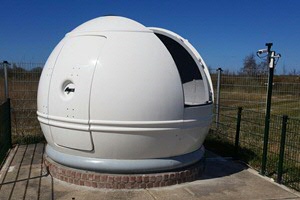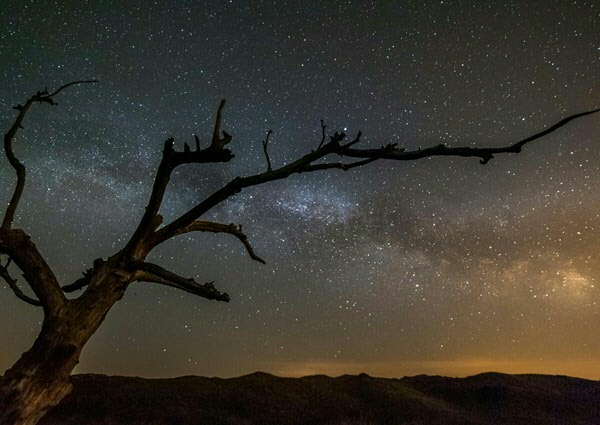Staatsbosbeheer en RUG openen Dark Sky Park Lauwersmeertelescoop
Tijdens de Nacht van het Wad en de Nacht van de Nacht op 30 oktober opent René Paas, Commissaris van de Koning in Groningen, de Dark Sky Park Lauwersmeertelescoop. De telescoop is tot stand gekomen door samenwerking tussen de Rijksuniversiteit Groningen en Staatsbosbeheer, met steun van het Gratamafonds. Studenten van de opleiding Sterrenkunde kunnen de telescoop gebruiken om hun waarneemvaardigheden te vergroten.

Dat de telescoop in het Nationaal Park Lauwersmeer staat is geen toeval: het natuurgebied is een van de laatste plekken in ons land waar het nog écht donker wordt. Op initiatief van de Provincie Groningen en Staatsbosbeheer kreeg het Lauwersmeergebied in 2016 van de International Dark Sky Association het predicaat Dark Sky Park. Hiermee is het gebied één van de veertig Dark Sky Parken in Europa die worden beschermd tegen lichtvervuiling en waar bezoekers ’s nachts welkom zijn om de duisternis te beleven. Staatsbosbeheer en het Kapteyn Instituut, het onderzoeksinstituut voor sterrenkunde van de Rijksuniversiteit Groningen, zijn gevraagd om bezoekers te voorzien van informatie over de sterrenhemel die in het gebied zo uitzonderlijk goed te zien is.
Heldere sterrenhemel
De Blaauw Sterrenwacht op de Zernike Campus werd te klein voor het groeiende aantal sterrenkundestudenten en het zicht vanuit deze telescoop wordt bovendien belemmerd door de lichtvervuiling van de omgeving. Zodoende ontstond vanuit het Kapteyn Instituut het idee om een op afstand bestuurbare, robotische telescoop in Dark Sky Park Lauwersmeer te plaatsen. Staatsbosbeheer, beheerder van het gebied, werkte mee en met financiële hulp van het Gratamafonds is de telescoop inmiddels klaar voor gebruik. Daarnaast is de telescoop met een door de Provincie Groningen gefinancierd rolstoeltoegankelijk waarneemplatform voorzien zodat ook bezoekers een plek hebben om de sterrenhemel te bekijken. In het Activiteitencentrum Lauwersnest wordt bijzondere aandacht besteed aan de duisternis in het gebied.
Donkerte van de Wadden
Ook in andere delen van het Werelderfgoed Waddenzee is nog duisternis te vinden en daarmee is het gebied uniek in Nederland. In ons dichtbevolkte land wordt het zicht op de sterrenhemel steeds meer bedreigd door toenemende lichtvervuiling. Staatsbosbeheer en de Rijksuniversiteit Groningen startten daarom samen met de Natuur en Milieufederaties Friesland, Groningen en Noord-Holland, Natuurmonumenten en de Waddenvereniging het programma Donkerte van de Wadden. Al deze partijen zetten zich in voor het behoud van duisternis: zo organiseren de Nederlandse Natuur en Milieufederaties al 17 jaar de Nacht van de Nacht, waarin er door het hele land evenementen worden georganiseerd en bedrijven en gemeenten hun lichten doven. Het programma Donkerte van de Wadden zet zich in voor duurzaam donkertetoerisme langs de gehele Waddenkust en wil een grotere maatschappelijke waardering voor de kracht en waarde van echte donkerte.

30 oktober: een avond vol duisternis
Dit jaar vallen de Nacht van de Nacht en de Nacht van het Wad, een initiatief van Donkerte van de Wadden, beide op 30 oktober. Samen bieden zij bezoekers een programma aan van donkerteactiviteiten in Nationaal Park Lauwersmeer. Als bekroning van de inmiddels vijf jaar durende samenwerking tussen Staatsbosbeheer en de Rijksuniversiteit Groningen is de telescoop klaar voor gebruik en wordt deze in de avond van 30 oktober geopend door de Groningse Commissaris van de Koning René Paas.
Meer informatie
- Voor het bezoekersprogramma van de Nacht van het Wad zie: www.nachtvanhetwad.nl
- Voor meer informatie over Donkerte van de Wadden zie: www.donkertevandewadden.nl
Meer nieuws
-
17 februari 2026
De lange zoektocht naar nieuwe fysica
-
10 februari 2026
Waarom slechts een klein aantal planeten geschikt is voor leven
